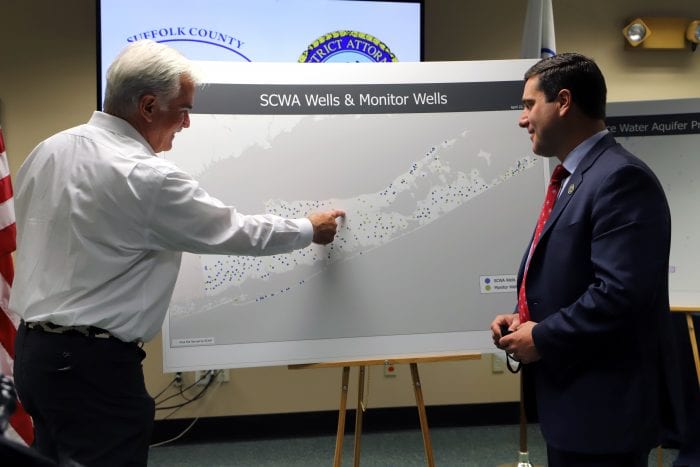Suffolk County Water Authority hosts forum
By Samantha Rutt
Suffolk County Water Authority hosted the next installment of its WaterTalk series on Feb. 20 at Amityville Public Library. The event allowed customers to learn more about their drinking water and engage in open dialogue with their water provider.
“Our drinking water continues to be a topic of discussion in the media, and we believe it is important for residents to have an open dialogue with their water provider to learn more,” SCWA Chairman Charles Lefkowitz said.
The WaterTalk series features a panel of experts who discuss various topics, including the quality of drinking water, the implementation of new infrastructure to enhance water service and quality, and the importance of conservation.
SCWA’s water quality and lab services director, Tom Schneider, and customer growth coordinator, John Marafino, represented the authority at the event.
“Suffolk County Water Authority is an independent public benefit corporation operating under the public authority law,” Marafino stated to open the meeting. “We serve about 1.2 million customers, and we began operations in 1951. We operate as a nonprofit, and we’re one of the country’s largest groundwater suppliers.”
Following the opening remarks and brief background of the authority, Schneider made a PowerPoint presentation to discuss the current infrastructure plans around the county, touching on water main management and emerging projects, and pump station projects.
Water quality
During Schneider’s presentation, attendees could ask questions, some of the most frequently asked centered around drinking water quality and what the authority adds and detects within our drinking water. Concerns for fluoride inclusion and potency arose from several attendees. Schneider eased the worry by explaining what the water authority does to regulate water quality.
“We add very small amounts of chlorine to our water. The chlorine kills any germs or bacteria that might be present in the water mains and as the water is delivered to you. The water as it comes from the ground is free of harmful bacteria,” Schneider said. “We also add a chemical called [hydrated] lime. The water we pump from our aquifers is slightly acidic, which can damage the pipes in your home over a long time. [Hydrated] lime makes the water less acidic, protecting the pipes in your home from corrosion.”
Schneider continued explaining the danger of the bacteria that are commonly found in untreated water:
“It’s keeping water safe. You don’t want to grow bacteria — bacteria is the stuff that will get you sick. There are no bacteria in the groundwater, and we want to ensure that the distribution system is safe. That’s why the chlorine is added, by law.”
The director recommended using filtration systems like ones built into refrigerators for those who are more sensitive to the added chemicals.
Schneider continued his presentation by touching on the groundwater laboratory — what it is, what it does and how it tests Suffolk County’s groundwater.
“We are consistently considered the largest groundwater laboratory in the country because we have 600 wells. We have 600 wells on 240 pieces of property,” Schneider explained.
“We test samples at the wellhead. We’re testing what’s in the source water and what’s in the groundwater before we do anything to it,” Schneider said. “Last year, we did 91,000 samples for about 190,000 different tests. We tested for 414 different parameters, more than what’s regulated. We have such a great laboratory, we have a lot of technical equipment, we have a lot of good scientists, we’re doing more than what’s required.”
He mentioned that if there is an environmental concern near any of SCWA’s wells or if traces of a regulated constituent have been found at a well site, SCWA will test at a greater frequency.
Schneider explained that when wells are in need of remediation, SCWA will use treatment systems, such as granular activated carbon, to remove contaminants from the water supply so the water SCWA serves always meets state and federal regulations.
In addition to the monitoring that SCWA does on a regular basis, the Suffolk County Department of Health Services also routinely performs tests of the public water supply at the wellhead and at various parts of the distribution system. The purpose of all this monitoring is to ensure that the highest quality water is served to consumers.
Another topic of concern addressed by the director was how safe is bottled water, a question the water authority has been addressing on a more regular basis.
“Bottled water actually has less regulation than drinking water,” Schneider explained. “It’s not regulated by the EPA, it’s regulated by the FDA but they have different rules. They’re not required to test for a lot of the emerging contaminants like we do in New York state.”
“Now there’s the concern about bottles — so when they manufacture the bottle, the manufacturing process imposes plastic microbeads in the water when opening and closing the tap and also releases plastic in the water,” he added.
Schneider urged everyone to be mindful of consuming plastics, reminding attendees that it is more cost-effective to get your own container and not deal with the waste from plastic.
“Plastic is not really recyclable like they say — it ends up in our landfills and oceans,” Schneider said.
The SCWA encouraged all interested residents to participate in their events in person or virtually, emphasizing the importance of understanding and safeguarding the community’s drinking water, as it is one of Suffolk County’s most precious natural resources.
Residents interested in attending a WaterTalk can register by emailing [email protected]. The WaterTalk is also accessible virtually through a link available on SCWA’s website for those unable to attend in person. For more information about the event, visit SCWA’s website, www.scwa.com.







